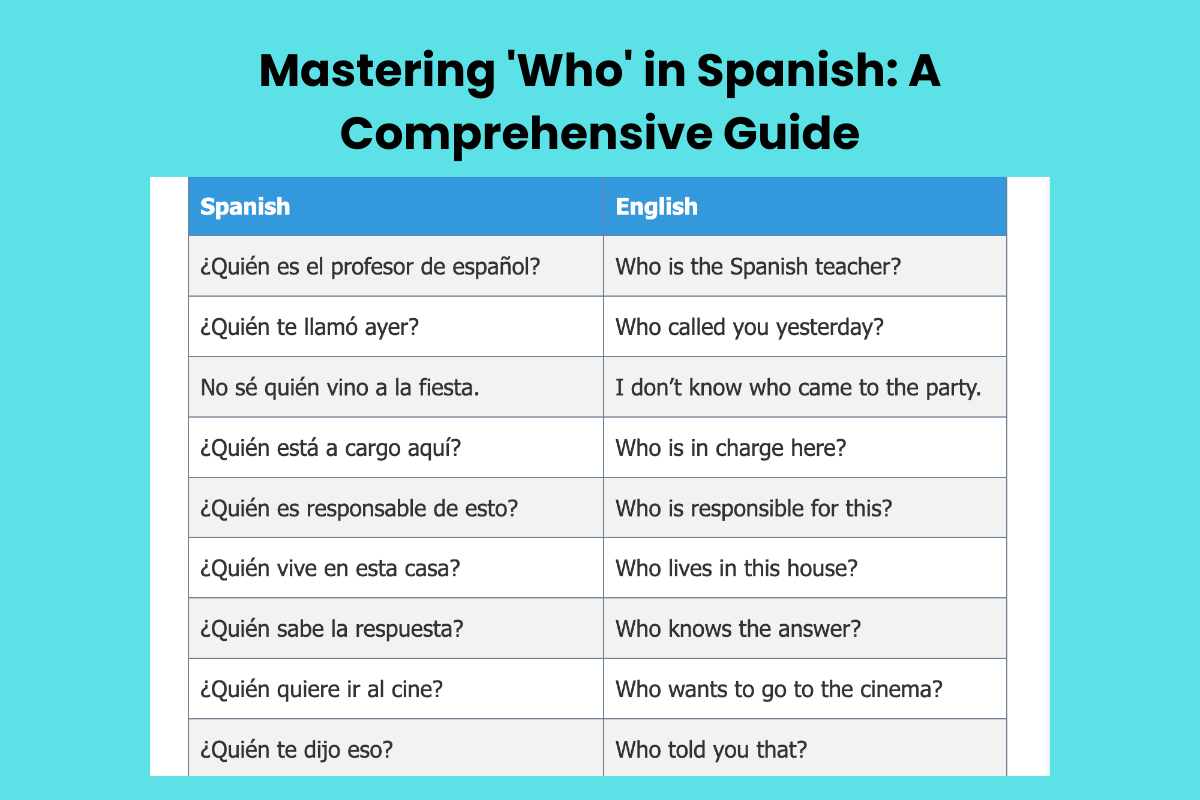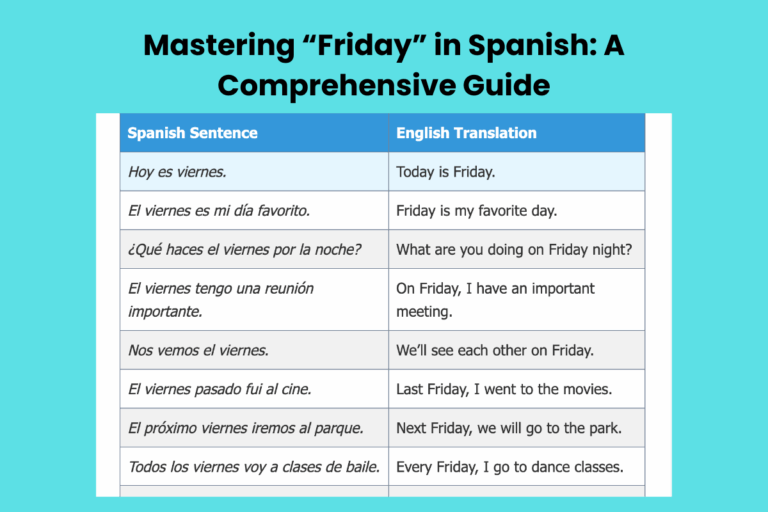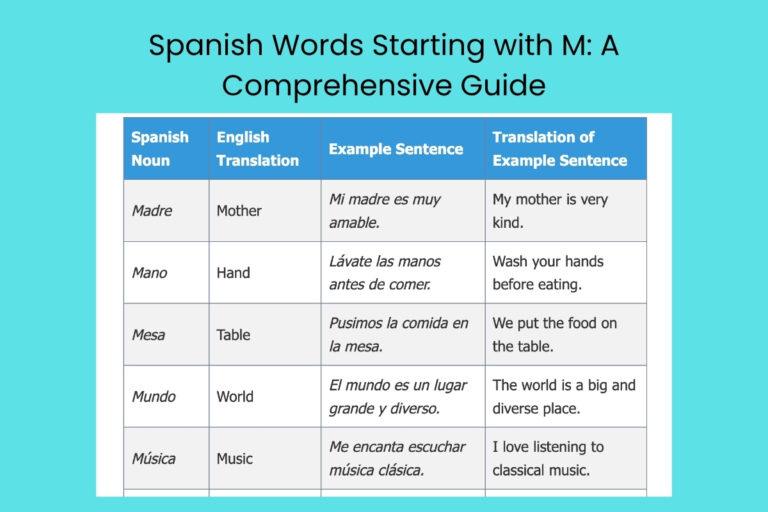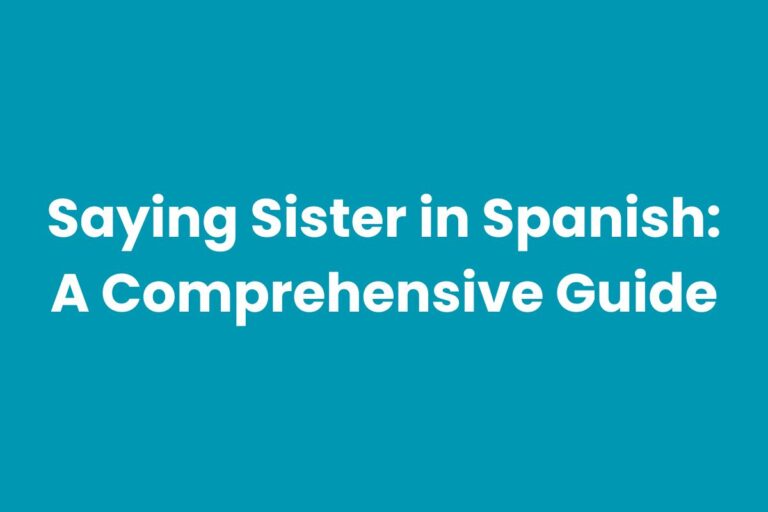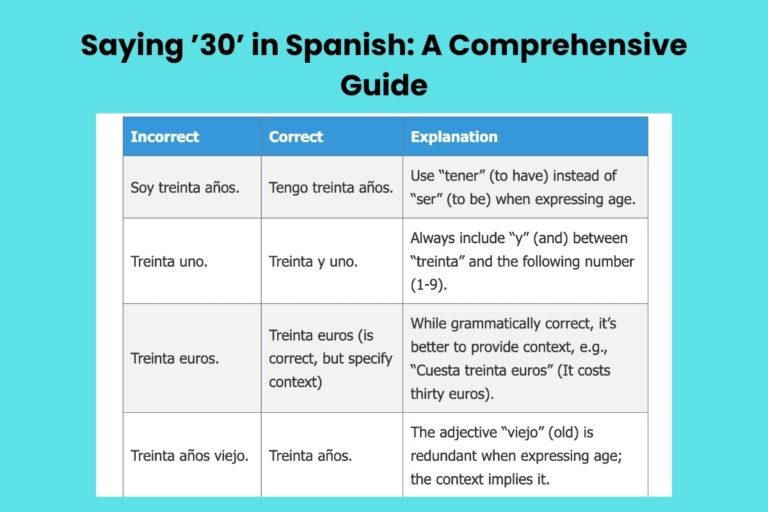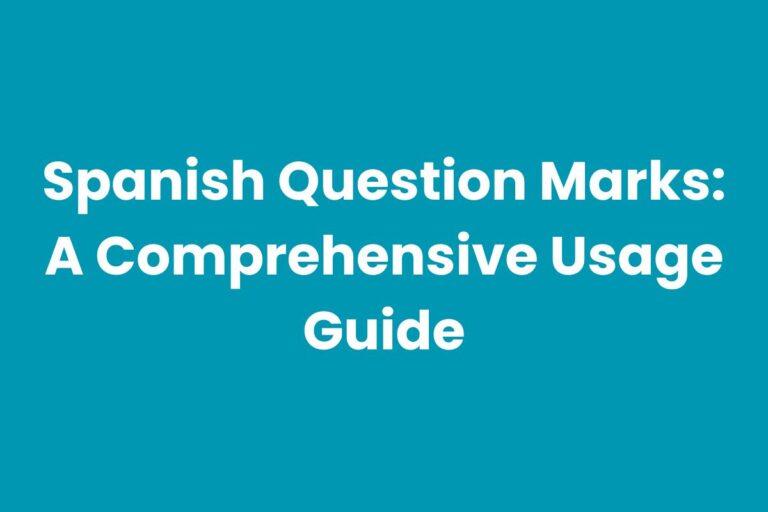Mastering ‘Who’ in Spanish: A Comprehensive Guide
Understanding how to express “who” in Spanish is crucial for forming questions, relative clauses, and generally discussing people. This article provides a detailed exploration of the various ways to translate and use “who” in Spanish, covering grammatical nuances, common mistakes, and practical examples.
Whether you’re a beginner or an advanced learner, this guide will help you confidently navigate the complexities of Spanish grammar and improve your fluency when speaking about people and their roles in different scenarios. This comprehensive resource will benefit students, travelers, and anyone looking to improve their Spanish communication skills.
Table of Contents
- Introduction
- Definition of ‘Who’ in Spanish
- Structural Breakdown
- Types and Categories
- Examples
- Usage Rules
- Common Mistakes
- Practice Exercises
- Advanced Topics
- FAQ
- Conclusion
Definition of ‘Who’ in Spanish
The English word “who” primarily functions as an interrogative pronoun (used to ask questions) and a relative pronoun (used to introduce relative clauses). In Spanish, the equivalent of “who” varies depending on the grammatical context. The most common translations are quién (singular) and quiénes (plural). These words are used to inquire about or refer to people. Understanding the nuances of when to use each form is crucial for accurate and effective communication in Spanish.
The Spanish terms quién and quiénes serve similar roles to “who” in English, acting as interrogative and relative pronouns. They are used to identify or ask about individuals or groups of people. The choice between quién and quiénes depends on whether you are referring to a single person or multiple people. Furthermore, prepositions like a (to), de (of/from), and con (with) can be combined with quién and quiénes to create phrases like a quién (to whom), de quién (whose/of whom), and con quién (with whom), expanding the range of expressions.
Structural Breakdown
The structure of sentences using quién and quiénes is similar to that of English sentences using “who.” As interrogative pronouns, they typically begin a question. As relative pronouns, they introduce a clause that provides more information about a person mentioned earlier in the sentence. The verb conjugation must agree with the subject of the sentence, whether it’s singular or plural. Word order can sometimes vary, especially in questions, but the basic structure remains consistent.
When using quién and quiénes in questions, it’s important to remember that Spanish typically uses an inverted question mark (¿) at the beginning of the sentence and a regular question mark (?) at the end. This helps to clearly mark the sentence as a question. Additionally, these words always carry an accent mark to distinguish them from the relative pronouns quien and quienes (without an accent), which are used in more formal contexts and often preceded by a preposition.
Types and Categories
Quién: Singular ‘Who’
Quién is used to refer to a single person. It’s the singular form of “who” and is used when asking or talking about one individual. It is essential to use quién with singular verb conjugations to maintain grammatical accuracy.
Quiénes: Plural ‘Who’
Quiénes is the plural form of “who” and is used to refer to multiple people. When you are asking or talking about more than one person, quiénes is the correct form. It requires the verb to be conjugated in the plural form to match the subject.
A Quién: ‘To Whom’ or ‘Whom’ as Indirect Object
A quién translates to “to whom” or “whom” when “whom” functions as an indirect object. The preposition a is essential because it indicates the recipient of an action. This form is used when you want to know who benefits or is affected by the verb’s action.
De Quién: ‘Whose’ or ‘Of Whom’
De quién translates to “whose” or “of whom.” It is used to ask about possession or origin. The preposition de indicates the relationship of belonging or source. This form is crucial for asking questions about ownership or describing someone’s origin or association.
Con Quién: ‘With Whom’
Con quién translates to “with whom.” It is used to ask about companionship or association. The preposition con indicates being in the company of someone. This form is helpful for asking who someone is with or who is accompanying them.
Examples
Quién Examples
The following table provides examples of how to use quién in various contexts. Each example demonstrates the singular form of “who” in Spanish, used to inquire or refer to a single individual.
| Spanish | English |
|---|---|
| ¿Quién es el profesor de español? | Who is the Spanish teacher? |
| ¿Quién te llamó ayer? | Who called you yesterday? |
| No sé quién vino a la fiesta. | I don’t know who came to the party. |
| ¿Quién está a cargo aquí? | Who is in charge here? |
| ¿Quién es responsable de esto? | Who is responsible for this? |
| ¿Quién vive en esta casa? | Who lives in this house? |
| ¿Quién sabe la respuesta? | Who knows the answer? |
| ¿Quién quiere ir al cine? | Who wants to go to the cinema? |
| ¿Quién te dijo eso? | Who told you that? |
| ¿Quién es tu mejor amigo? | Who is your best friend? |
| ¿Quién puede ayudarme? | Who can help me? |
| ¿Quién está tocando la puerta? | Who is knocking on the door? |
| ¿Quién va a venir a la reunión? | Who is going to come to the meeting? |
| ¿Quién es el autor de este libro? | Who is the author of this book? |
| ¿Quién te dio este regalo? | Who gave you this gift? |
| ¿Quién está cantando? | Who is singing? |
| ¿Quién es el nuevo director? | Who is the new director? |
| ¿Quién te enseño a bailar? | Who taught you how to dance? |
| ¿Quién es la persona que te gusta? | Who is the person you like? |
| ¿Quién es tu actor favorito? | Who is your favorite actor? |
| ¿Quién es tu cantante favorito? | Who is your favorite singer? |
| ¿Quién es el mejor jugador del mundo? | Who is the best player in the world? |
| ¿Quién es tu superhéroe favorito? | Who is your favorite superhero? |
| ¿Quién es el presidente? | Who is the president? |
| ¿Quién es el dueño de este coche? | Who is the owner of this car? |
Quiénes Examples
The following table provides examples of how to use quiénes in various contexts. Each example demonstrates the plural form of “who” in Spanish, used to inquire or refer to multiple individuals.
| Spanish | English |
|---|---|
| ¿Quiénes son tus padres? | Who are your parents? |
| ¿Quiénes van a venir a la cena? | Who is going to come to dinner? |
| ¿Quiénes son los estudiantes nuevos? | Who are the new students? |
| ¿Quiénes están de acuerdo con la propuesta? | Who agrees with the proposal? |
| ¿Quiénes son los miembros del equipo? | Who are the members of the team? |
| ¿Quiénes son los ganadores del concurso? | Who are the winners of the contest? |
| ¿Quiénes viven en ese edificio? | Who lives in that building? |
| ¿Quiénes son los responsables de este proyecto? | Who are responsible for this project? |
| ¿Quiénes son tus ídolos? | Who are your idols? |
| ¿Quiénes quieren participar? | Who wants to participate? |
| ¿Quiénes están listos para empezar? | Who is ready to start? |
| ¿Quiénes son tus hermanos? | Who are your siblings? |
| ¿Quiénes son tus amigos? | Who are your friends? |
| ¿Quiénes son tus modelos a seguir? | Who are your role models? |
| ¿Quiénes son tus compañeros de clase? | Who are your classmates? |
| ¿Quiénes son los administradores de la empresa? | Who are the managers of the company? |
| ¿Quiénes son los que votaron en contra? | Who are the ones who voted against it? |
| ¿Quiénes son los que te apoyan? | Who are the ones who support you? |
| ¿Quiénes son los dueños de esta casa? | Who are the owners of this house? |
| ¿Quiénes son los que están en la foto? | Who are the ones in the photo? |
| ¿Quiénes son los que están en la lista? | Who are the ones on the list? |
| ¿Quiénes son los que van a venir a la fiesta? | Who are the ones who are going to come to the party? |
| ¿Quiénes son los que van a ir al concierto? | Who are the ones who are going to go to the concert? |
| ¿Quiénes son los que van a participar en la competencia? | Who are the ones who are going to participate in the competition? |
| ¿Quiénes son los que van a jugar en el partido? | Who are the ones who are going to play in the game? |
A Quién Examples
The following table provides examples of how to use a quién in various contexts. Each example demonstrates the use of “to whom” or “whom” as an indirect object in Spanish.
| Spanish | English |
|---|---|
| ¿A quién le diste el libro? | To whom did you give the book? |
| ¿A quién vas a llamar? | Whom are you going to call? |
| ¿A quién escribiste la carta? | To whom did you write the letter? |
| ¿A quién le pediste ayuda? | Whom did you ask for help? |
| ¿A quién le vas a contar el secreto? | To whom are you going to tell the secret? |
| ¿A quién le prestaste tu coche? | To whom did you lend your car? |
| ¿A quién le regalaste las flores? | To whom did you give the flowers? |
| ¿A quién le compraste el regalo? | To whom did you buy the gift? |
| ¿A quién le enviaste el mensaje? | To whom did you send the message? |
| ¿A quién le ofreciste el trabajo? | To whom did you offer the job? |
| ¿A quién le recomendaste este restaurante? | To whom did you recommend this restaurant? |
| ¿A quién le contaste tus problemas? | To whom did you tell your problems? |
| ¿A quién le explicaste la situación? | To whom did you explain the situation? |
| ¿A quién le mostraste las fotos? | To whom did you show the photos? |
| ¿A quién le presentaste a tu novio? | To whom did you introduce your boyfriend? |
| ¿A quién le pediste permiso? | To whom did you ask for permission? |
| ¿A quién le agradeciste por su ayuda? | To whom did you thank for their help? |
| ¿A quién le confesaste tu amor? | To whom did you confess your love? |
| ¿A quién le revelaste tu secreto? | To whom did you reveal your secret? |
| ¿A quién le devolviste el dinero? | To whom did you return the money? |
| ¿A quién le diste las gracias? | To whom did you say thank you? |
| ¿A quién le debes dinero? | To whom do you owe money? |
| ¿A quién le escribes correos electrónicos? | To whom do you write emails? |
| ¿A quién le vendiste tu coche? | To whom did you sell your car? |
| ¿A quién le alquilaste tu apartamento? | To whom did you rent your apartment? |
De Quién Examples
The following table provides examples of how to use de quién in various contexts. Each example demonstrates the use of “whose” or “of whom” in Spanish.
| Spanish | English |
|---|---|
| ¿De quién es este libro? | Whose book is this? |
| ¿De quién son estas llaves? | Whose keys are these? |
| ¿De quién es la idea? | Whose idea is it? |
| ¿De quién es este coche? | Whose car is this? |
| ¿De quién es la casa? | Whose house is it? |
| ¿De quién es esta bicicleta? | Whose bicycle is this? |
| ¿De quién es este perro? | Whose dog is this? |
| ¿De quién es este gato? | Whose cat is this? |
| ¿De quién es este paraguas? | Whose umbrella is this? |
| ¿De quién es este abrigo? | Whose coat is this? |
| ¿De quién es este teléfono? | Whose phone is this? |
| ¿De quién es este ordenador? | Whose computer is this? |
| ¿De quién es esta mochila? | Whose backpack is this? |
| ¿De quién es esta maleta? | Whose suitcase is this? |
| ¿De quién es esta bufanda? | Whose scarf is this? |
| ¿De quién es este sombrero? | Whose hat is this? |
| ¿De quién es este reloj? | Whose watch is this? |
| ¿De quién es este collar? | Whose necklace is this? |
| ¿De quién es este anillo? | Whose ring is this? |
| ¿De quién es este pendiente? | Whose earring is this? |
| ¿De quién es este retrato? | Whose portrait is this? |
| ¿De quién es esta pintura? | Whose painting is this? |
| ¿De quién es esta canción? | Whose song is this? |
| ¿De quién es esta melodía? | Whose melody is this? |
| ¿De quién es este poema? | Whose poem is this? |
Con Quién Examples
The following table provides examples of how to use con quién in various contexts. Each example demonstrates the use of “with whom” in Spanish.
| Spanish | English |
|---|---|
| ¿Con quién vas al cine? | With whom are you going to the cinema? |
| ¿Con quién estudias? | With whom do you study? |
| ¿Con quién vives? | With whom do you live? |
| ¿Con quién trabajas? | With whom do you work? |
| ¿Con quién viajas? | With whom do you travel? |
| ¿Con quién almuerzas? | With whom do you have lunch? |
| ¿Con quién cenas? | With whom do you have dinner? |
| ¿Con quién hablas por teléfono? | With whom do you talk on the phone? |
| ¿Con quién juegas al fútbol? | With whom do you play soccer? |
| ¿Con quién sales los fines de semana? | With whom do you go out on weekends? |
| ¿Con quién vas a la fiesta? | With whom are you going to the party? |
| ¿Con quién vas al concierto? | With whom are you going to the concert? |
| ¿Con quién vas de compras? | With whom do you go shopping? |
| ¿Con quién vas a la playa? | With whom are you going to the beach? |
| ¿Con quién vas a las montañas? | With whom are you going to the mountains? |
| ¿Con quién vas al gimnasio? | With whom do you go to the gym? |
| ¿Con quién vas a la biblioteca? | With whom do you go to the library? |
| ¿Con quién vas al museo? | With whom do you go to the museum? |
| ¿Con quién vas al parque? | With whom do you go to the park? |
| ¿Con quién vas al teatro? | With whom do you go to the theater? |
| ¿Con quién vas a la iglesia? | With whom do you go to the church? |
| ¿Con quién vas a la escuela? | With whom do you go to the school? |
| ¿Con quién vas a la universidad? | With whom do you go to the university? |
| ¿Con quién vas al trabajo? | With whom do you go to the work? |
| ¿Con quién vas al supermercado? | With whom do you go to the supermarket? |
Usage Rules
The use of quién and quiénes follows specific rules to ensure grammatical correctness. Here are some key guidelines:
- Singular vs. Plural: Use quién for singular subjects and quiénes for plural subjects. The verb conjugation must match accordingly.
- Prepositions: When using prepositions like a, de, and con, ensure they are correctly placed before quién or quiénes to convey the intended meaning (e.g., a quién, de quién, con quién).
- Interrogative Sentences: In questions, quién and quiénes always carry an accent mark. This distinguishes them from relative pronouns (quien and quienes without an accent).
- Relative Clauses: In formal contexts, quien and quienes (without an accent) can be used as relative pronouns, often after a preposition. For example, “El hombre con quien hablé” (The man with whom I spoke).
Remember that the choice between quién and quiénes depends entirely on the number of people you are referring to. Consistent practice and exposure to different contexts will help solidify your understanding of these rules. Attention to detail, especially concerning verb agreement and preposition usage, is essential for avoiding common errors.
Common Mistakes
Several common mistakes can occur when using quién and quiénes. Understanding these errors can help you avoid them.
- Incorrect Number Agreement: Using quién when referring to multiple people, or vice versa.
- Incorrect: ¿Quiénes es tu padre?
- Correct: ¿Quién es tu padre?
- Incorrect: ¿Quién es tus padres?
- Correct: ¿Quiénes son tus padres?
- Omitting Prepositions: Forgetting to include necessary prepositions like a, de, or con.
- Incorrect: ¿Quién le diste el libro?
- Correct: ¿A quién le diste el libro?
- Incorrect Accent Usage: Forgetting to use the accent mark in interrogative sentences.
- Incorrect: Quien es?
- Correct: ¿Quién es?
By being mindful of these common errors and practicing correct usage, you can significantly improve your accuracy and fluency when using quién and quiénes. Regular review and self-correction are essential tools for language learning.
Practice Exercises
Complete the following sentences using the correct form of “who” in Spanish (quién, quiénes, a quién, de quién, con quién).
| Question | Answer |
|---|---|
| 1. ¿__________ es el nuevo empleado? | ¿Quién es el nuevo empleado? |
| 2. ¿__________ son los estudiantes de intercambio? | ¿Quiénes son los estudiantes de intercambio? |
| 3. ¿A __________ le enviaste el correo electrónico? | ¿A quién le enviaste el correo electrónico? |
| 4. ¿De __________ es este paraguas? | ¿De quién es este paraguas? |
| 5. ¿Con __________ vas a la fiesta? | ¿Con quién vas a la fiesta? |
| 6. ¿__________ sabe la respuesta a esta pregunta? | ¿Quién sabe la respuesta a esta pregunta? |
| 7. ¿__________ son los que llegaron tarde? | ¿Quiénes son los que llegaron tarde? |
| 8. ¿A __________ le pediste ayuda con la tarea? | ¿A quién le pediste ayuda con la tarea? |
| 9. ¿De __________ es esta casa tan grande? | ¿De quién es esta casa tan grande? |
| 10. ¿Con __________ prefieres estudiar? | ¿Con quién prefieres estudiar? |
More Practice. Translate the following sentences into Spanish using the appropriate form of “who”.
| English | Spanish |
|---|---|
| 1. Who is the president of the company? | ¿Quién es el presidente de la compañía? |
| 2. Who are the members of the board? | ¿Quiénes son los miembros del consejo? |
| 3. To whom did you give the report? | ¿A quién le diste el informe? |
| 4. Whose car is parked outside? | ¿De quién es el coche que está aparcado afuera? |
| 5. With whom will you discuss the project? | ¿Con quién discutirás el proyecto? |
| 6. Who wants to volunteer for the event? | ¿Quién quiere ser voluntario para el evento? |
| 7. Who are the candidates for the position? | ¿Quiénes son los candidatos para el puesto? |
| 8. To whom should I address the letter? | ¿A quién debo dirigir la carta? |
| 9. Whose responsibility is it to organize the meeting? | ¿De quién es la responsabilidad de organizar la reunión? |
| 10. With whom did you collaborate on the research? | ¿Con quién colaboraste en la investigación? |
Advanced Topics
For advanced learners, exploring more complex uses of “who” in Spanish can further refine your language skills. This includes understanding the relative pronouns quien and quienes (without an accent), which are often used in formal writing and speech. These forms typically appear after prepositions and introduce relative clauses that refer to a specific person or people.
For example, consider the sentence “El hombre a quien vi ayer es mi profesor” (The man whom I saw yesterday is my teacher). Here, a quien introduces a relative clause that provides more information about “el hombre.” Similarly, you might encounter constructions like “Las personas con quienes trabajo son muy amables” (The people with whom I work are very kind). Mastering these subtle nuances can elevate your Spanish proficiency and allow you to express yourself with greater precision and sophistication.
FAQ
- What is the difference between quién and quiénes?
Quién is the singular form of “who,” used to refer to one person. Quiénes is the plural form, used to refer to multiple people. The verb conjugation must match the number of people being referred to.
- When do I use a quién?
You use a quién to mean “to whom” or “whom” when “whom” is the indirect object of a verb. It indicates the recipient of an action (e.g., “¿A quién le diste el libro?” – To whom did you give the book?).
- What does de quién mean?
De quién means “whose” or “of whom.” It is used to ask about possession or origin (e.g., “¿De quién es este coche?” – Whose car is this?).
- How do I use con quién?
Con quién means “with whom.” It is used to ask about companionship or association (e.g., “¿Con quién vas al cine?” – With whom are you going to the cinema?).
- Why do quién and quiénes have accent marks?
The accent marks distinguish the interrogative pronouns quién and quiénes from the relative pronouns quien and quienes (without an accent). The interrogative forms are used in questions, while the relative forms are used in more formal contexts to introduce relative clauses.
- Can I use quien and quienes (without accents) instead of quién and quiénes?
In most everyday situations, quién and quiénes are the preferred forms for asking questions. Quien and quienes (without accents) are typically reserved for more formal contexts and are often preceded by a preposition.
- What is the correct word order when using quién in a question?
The word order is generally the same as in English. The question word (quién) comes first, followed by the verb and then the subject, if applicable (e.g., “¿Quién es el profesor?” – Who is the teacher?).
- How do I avoid common mistakes when using ‘who’ in Spanish?
Pay close attention to number agreement (singular vs. plural), preposition usage, and accent marks. Practice regularly and review your work to identify and correct errors. Consider using language learning apps or working with a tutor to get personalized feedback.
- Are there regional variations in the use of ‘who’ in Spanish?
While the basic rules for using quién and quiénes are consistent across Spanish-speaking regions, some minor variations in usage or word choice may exist. However, these differences are unlikely to cause confusion.
- How can I improve my understanding of ‘who’ in Spanish?
Immerse yourself in the language by reading books, watching movies, and listening to music in Spanish. Practice speaking with
Conclusion
Mastering the use of “who” in Spanish requires understanding the nuances between quién and quiénes, as well as their prepositional forms like a quién, de quién, and con quién. By grasping these distinctions and practicing consistently, you can significantly improve your ability to ask and answer questions about people in Spanish. Remember to pay attention to number agreement, preposition usage, and accent marks to avoid common mistakes. With dedication and practice, you’ll confidently navigate the intricacies of Spanish grammar and communicate effectively in a variety of contexts. Keep practicing, and you’ll find yourself using these forms naturally and accurately in no time.

